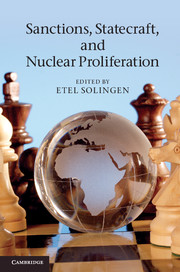Book contents
- Frontmatter
- Contents
- Figures
- Tables
- Contributors
- Preface and acknowledgments
- Part I Anatomy of inducements
- Part II Competing perspectives
- 5 An analytically eclectic approach to sanctions and nonproliferation
- 6 Threats for peace?
- Part III Reassessing the record: focused perspectives
- Part IV Conclusions: understanding causal mechanisms and policy implications
- References
- Index
6 - Threats for peace?
The domestic distributional effects of military threats
Published online by Cambridge University Press: 05 June 2012
- Frontmatter
- Contents
- Figures
- Tables
- Contributors
- Preface and acknowledgments
- Part I Anatomy of inducements
- Part II Competing perspectives
- 5 An analytically eclectic approach to sanctions and nonproliferation
- 6 Threats for peace?
- Part III Reassessing the record: focused perspectives
- Part IV Conclusions: understanding causal mechanisms and policy implications
- References
- Index
Summary
In June 2008, Israel’s Deputy Prime Minister, Shaul Mofaz, promised, “If Iran continues its programme to develop nuclear weapons, we will attack it. The window of opportunity has closed. The sanctions are not effective. There will be no alternative but to attack Iran in order to stop the Iranian nuclear programme.” These threats echoed those made by US President George Bush in 2007 when he cautioned Iran that developing nuclear weapons increased the prospects for World War III, a reference to the willingness to use military force if Iran developed nuclear weapons. As Alexander George notes in his study of coercive diplomacy – defined as threats of force to persuade another state to stop a particular action – “actions do not always speak louder than words.” Rather, they may both be important in achieving diplomatic goals especially when those threats are viewed as credible. But do threatening words or actions work? Can military threats against a suspected proliferator actually cause the state to reconsider its nuclear program?
This chapter answers those questions by looking at the domestic distributional effects of threats against nuclear programs. Whereas other studies of coercive diplomacy look at a state’s incentive structures more broadly, this one takes into account the theoretical expectation that domestic coalitions may respond differently to the same outside threats. In particular, we discuss a causal mechanism showing how different coalition types may have different interests in integrating with the global economy that might make them more or less likely to respond to outside threats in a manner favorable to the threatening state. Not only may certain pressuring strategies not work with particular domestic coalitions, these strategies might actually be counterproductive, playing into the hands of coalitions that have an interest in isolating the country from the global economy and thus making denuclearization less likely. Whereas previous studies of coercive diplomacy effectively “black boxed” the state, this analysis assumes that the domestic political environment conditions the incentive structures and likelihood that the target state will respond to the political objectives – in this case denuclearization – of the “sender” state.
- Type
- Chapter
- Information
- Sanctions, Statecraft, and Nuclear Proliferation , pp. 174 - 208Publisher: Cambridge University PressPrint publication year: 2012
- 2
- Cited by



